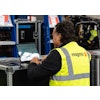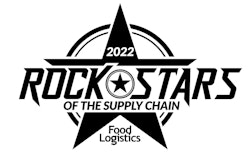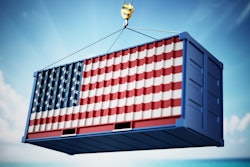
Today, one of the biggest problems the food supply chain faces is “a lack of visibility.” A tremendous amount of uncertainty has been introduced because sellers and buyers cannot usually see precisely where food is in its long journey from the farm to retailers or the groceries.
Sellers without visibility do not have an immediate sense of when demand is spiking or dropping or when competitive brands may be entering the marketplace, so they often have to make decisions based on partial information.
Buyers such as groceries or restaurants without visibility do not know:
- How long has food been in transit?
- What sort of environments it has gone through while en route?
- If the food has been exposed to either less-than-optimal sanitary conditions or kept at improper temperatures?
These issues lead to food waste, and is a huge problem nationwide. Every year, the United States experiences between 30-40% of food waste.
Visibility affects performance too. If a seller does not have visibility:
- How will they plan and route their trucks, boats or rail freight?
- How can they have the clarity to make alternate plans to avoid a disaster if they cannot even see where their food is at any given moment?
Sellers need the correct data to make appropriate decisions about routes and put together forecasts. Without visibility, food movement through the supply chain might become erratic, impeded or unknown, leading to food waste.
Blockchain and trust
Blockchain technology introduces a way to solve these sorts of problems. Blockchain provides a guaranteed and verified way for multiple stakeholders to see transactions throughout the supply chain and know that they have not compromised or tampered. Once in place, this technology can increasingly make the frequent invoice management disputes of the past a near-obsolete thing.
Trust matters a lot; the first thing blockchain does is build trust. And, it does that by providing enhanced visibility to all stakeholders throughout the food supply chain. If you check the many sorts of reports measuring trust from companies such as Nielsen or other market research enterprises, you will find that the trust in brands in the food supply chain is getting reduced, and there are a tremendous number of unknown new entrants. By preserving trust, Blockchain helps strengthen and reinforce the brands of those who use it.
Blockchain effect on ROI
Blockchain can provide a tremendous return on investment (ROI) as it provides an immutable source of data. However, there are a few caveats to keep in mind.
This first one is to be careful of any data you input at the source. If by chance the data you put into the blockchain supply chain is compromised, then all the data throughout the chain is compromised; after all, garbage in, garbage out.
Another thing to keep in mind, especially for those with limited budgets, is that it is often feasible to implement blockchain partially in critical parts of the supply chain where the data is most vital and sensitive. Blockchain is not known for its excellent storage capacity; it is known for offering an element of trust. Therefore, implement blockchain in the areas where you have the most critical aspects of data in the supply chain and that you may need to reference for future needs. Blockchain can serve the needs of smaller companies, large enterprises and entrepreneurs.
Regulation, compliance and international acceptance
Regulation can certainly be overdone, but sometimes it gets a bad rap. Since the FDA is looking at food supply chains, blockchain technology and forming laws, that is a good thing. It is important to have the basics in place.
What is terrific about blockchain? There is minimal scope for anyone to tamper once the data is in the system. That gives it credibility among inspectors, quality assurance people or food inspectors.
Regulation can help prevent food waste since a common source of food waste occurs in manufacturing facilities non-compliant or not careful about managing their inventory control or keeping consistent low temperatures. Blockchain is being granted legal status in some countries as a preferred technology to use in food supply chain situations. Internationally, China is the leader in blockchain implementations, followed closely by Switzerland, Japan, Malta, Singapore, Dubai, and the UAE.
In the United States, Wyoming is the No. 1 blockchain adopter, followed by New York City, New York State, California, and Arizona.


















